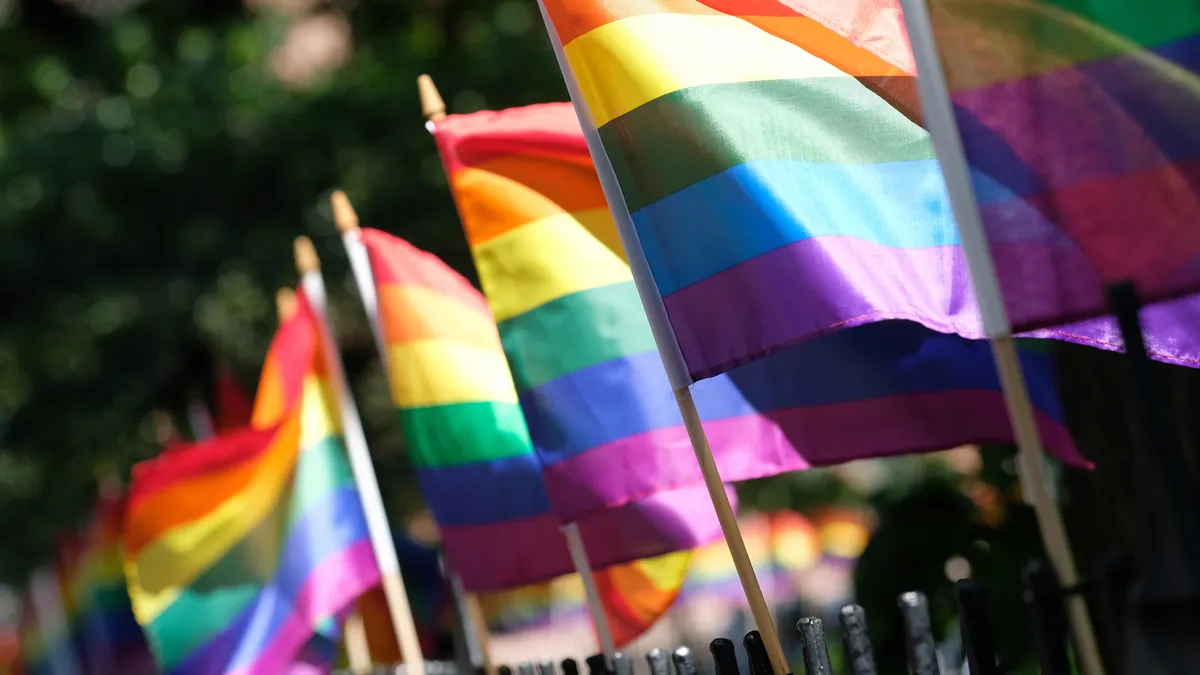Dive Brief:
- A recent survey from LinkedIn shined a light on concerns LGBTQ individuals harbor about sharing their identity at work. Nearly one-quarter (24%) of respondents reported that they are not open about their identity and 26% reported being worried that being open about their identities would cause coworkers to treat them differently.
- In addition, close to half of respondents (47%) said they believed being out would hurt their job search efforts. The survey, conducted by YouGov between April 30 and May 12, collected responses from 2,001 LGBTQ professionals between the ages of 18 and 69.
- Other respondents reported experiencing an inclusive and supportive workplace culture. "Those who are open at work as LGBTQ individuals said that it has helped them connect with others for support and build better relationships within their profession," Andrew Seaman, LinkedIn News senior editor for job search and careers, wrote in a blog post on the survey results. "They also said they feel like a weight was lifted when they came out at work."
Dive Insight:
In June 2020, the U.S. Supreme Court ruled that employment discrimination based on sexual orientation or gender identity is unconstitutional under Title VII of the Civil Rights Act of 1964. As Seaman notes in his blog post, however, the ruling does not apply to employers with 15 or fewer employees, leaving gaps in the protections experienced by LGBTQ individuals. The ruling also cannot account for more subtle aspects of workplace culture and inclusiveness.
Politicians have undertaken other measures to try to expand workplace protections. Earlier this year, the U.S. House of Representatives passed the Equality Act, which sought to ensure no future or contrary reinterpretations of the Bostock case and expand protections beyond the workplace, sources previously told HR Dive; the bill stalled in the Senate.
The Executive Branch has been more forceful in its efforts to address LGBTQ discrimination issues, with a U.S. Department of Justice official telling attendees at an American Bar Association conference the agency would "vigorously enforce" prohibitions on discrimination toward members of the identity group.
The LinkedIn survey data goes hand in hand with other recent results that show LGBTQ individuals are less satisfied at work. A May 2021 audit from Glassdoor recently found that LGBTQ employees rated their employers slightly lower — 3.27 stars out of 5, compared to 3.47 out of 5 — than non-LGBTQ respondents, and that they were less satisfied with compensation and benefits and career opportunities than their counterparts.
Organizations can help address the strain felt by LGBTQ staff by instituting clear policies that protect such workers; instituting supportive and inclusive hiring practices; and creating dedicated spaces for LGBTQ workers, such as employee groups — all practices that nearly half or more than half of respondents desired. The LinkedIn survey also found that coworker allyship made a significant difference, a finding supported by other recent research.














